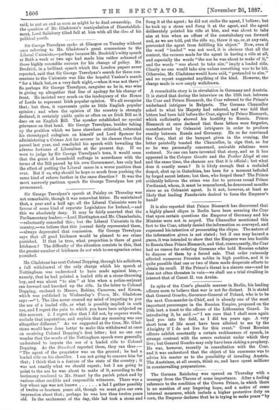Mr. Gladstone has sent Colonel Dopping, through his solicitors, a
full withdrawal of the only charge which his speech at Nottingham was understood to have made against him,— namely, that he had pointed a loaded rifle at a stone-throwing boy, and was about "to aim" at him when a police-serjeant ran forward and knocked up the rifle. In the letter to Colonel Dopping, enclosed to Messrs. Robins, Cameron, and Kemm, which was published in Wednesday's Times, Mr. Gladstone
says 1. The idea never crossed my mind of imputing to you the use of a loaded rifle, or what is possibly implied in such use, and I regret the pain to which you have been subjected on this account. 2. I regret also that I did not, by express words, exclude that imputation, and explain that my meaning was one altogether different." As we suggested at the time, Mr. Glad- stone would have done better to make this withdrawal at once on receiving Colonel Dopping's first letter ; but no one can wonder that the words of the Nottingham speech were generally understood to impute the use of a loaded rifle to Colonel Dopping. As the Standard reported them, they ran thus :— "The agent of the proprietor was on the ground ; he had a loaded rifle on his shoulder. I am not going to censure him for that ; I think that is a feature of the state of the country ; it was not exactly what we should expect ; but I am going to point to the use be was about to make of it, according to the testimony rendered to Mr. Stuart by the parish priest and by various other credible and responsible witnesses. There was a
boy whose age was not known a lad I gather possibly of twelve or fourteen years old, though we must give our own impression about that ; perhaps he was less than twelve years old. In the excitement of the day, this lad took a stone and flung it at the agent ; he did not strike the agent, I believe; but he took up a stone and flung it at the agent, and the agent deliberately pointed his rifle at him, and was about to take aim at him when an officer of the constabulary ran forward and, as we are told, put the rifle up, threw it up, or, at any rate, prevented the agent from fulfilling his object." Now, even if the word " loaded " was not used, it is obvious that all the context, the excuses made for the agent in having a rifle at all, and especially the words "the use he was about to make of it," and the words " was about to take aim," imply a loaded rifle. Clearly no one would take aim unless something was to be hit. Otherwise, Mr. Gladstone would have said, "pretended to aim," and no report suggested anything of the kind. However, the charge made is now amply withdrawn.










































 Previous page
Previous page